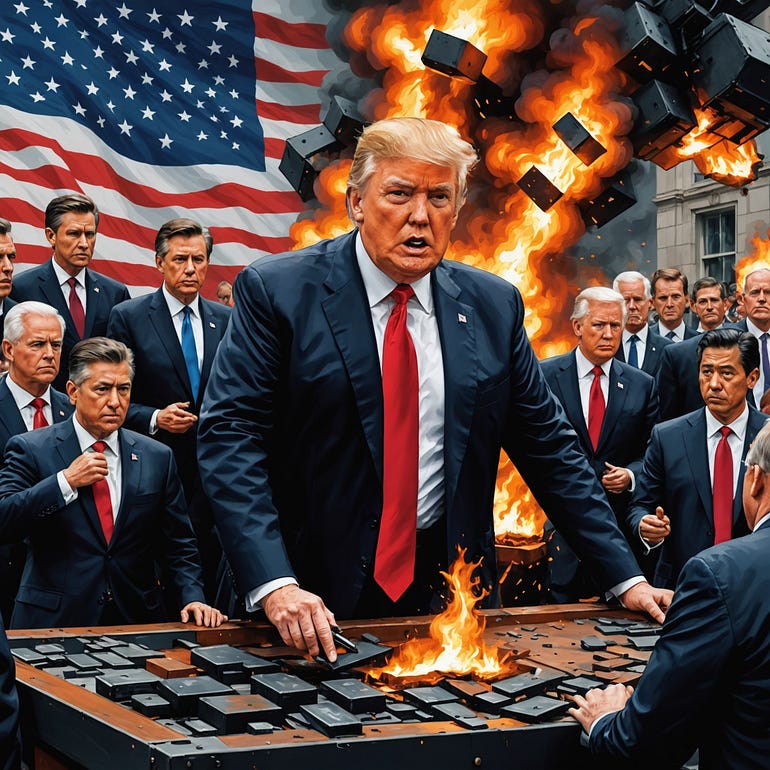China Persists in Trade War with the U.S
The ongoing trade war between the United States and China presents a unique opportunity for India to capitalize on the shifting dynamics of global trade.

As tensions escalate and tariffs are imposed, India stands to benefit significantly in several ways.
The U.S.-China trade war presents a complex landscape where the U.S. has the potential to access nearly 70 nations with tariffs, benefiting smaller producing countries while China risks losing market share and competitiveness.
The implications for China are significant, as it may struggle to maintain its manufacturing capacity and economic growth in the face of increased competition.
Despite the clear benefits of negotiation, political pressures, issues of national pride, and long-term strategic goals may prevent meaningful dialogue at the presidential level.
This situation underscores the intricate balance between economic interests and geopolitical realities in global trade dynamics.
Detailed Analysis of the U.S.-China Trade War and Its Implications
1. Key Components of the Trade War Between the U.S. and China
The trade war between the U.S. and China has been characterized by the following key components:
- Tariffs: The U.S. has imposed significant tariffs on a wide range of Chinese goods, with rates reaching as high as 25% or more. In response, China has retaliated with tariffs on U.S. products, creating a cycle of escalating trade barriers.
- Trade Deficits: The U.S. has long expressed concerns over its trade deficit with China, which has fueled the desire to reduce imports from China while increasing exports to other nations.
- Intellectual Property and Technology Transfer: A major point of contention has been China’s practices regarding intellectual property rights and forced technology transfers from U.S. companies operating in China.
- Geopolitical Tensions: The trade war is also influenced by broader geopolitical issues, including military tensions in the Asia-Pacific region and competition for global influence.
2. Potential Benefits for the 70 Nations in Accessing the U.S. Market with Tariffs
The nearly 70 nations( Including India ) involved in tariff negotiations with the U.S. stand to gain several benefits:
- Market Access: These countries could gain enhanced access to the U.S. consumer market, which is one of the largest in the world. This access can lead to increased exports and economic growth.
- Diversification of Trade: By engaging with the U.S. market, these nations can diversify their trade relationships, reducing reliance on any single market, including China.
- Investment Opportunities: Increased trade with the U.S. may attract foreign direct investment, as U.S. companies look to establish operations in countries that offer favorable trade terms.
- Competitive Advantage: Smaller producing countries, such as Thailand, South Korea, Japan, Vietnam, and India, may find themselves in a more competitive position as they can offer products at lower prices compared to China, which faces higher tariffs.
3. Implications for China in Terms of Market Share and Competitiveness
The trade war poses significant challenges for China:
- Loss of Market Share: As tariffs make Chinese goods more expensive in the U.S. market, China risks losing market share to other countries that can provide similar products at lower prices. This shift could lead to a decline in exports and overall economic growth.
- Increased Competition: Countries like Thailand, Vietnam, and India may capitalize on the situation by increasing their exports to the U.S., further eroding China’s competitive position. These nations may also attract investment from companies seeking to avoid tariffs on Chinese goods.
- Manufacturing Capacity Issues: If Chinese manufacturers cannot fill their factories due to reduced orders from the U.S., they may face overcapacity issues, leading to layoffs and economic instability. This could further diminish China’s manufacturing sector’s competitiveness.
4. Reasons Why Negotiation at the Presidential Level May Not Be Pursued
Despite the potential benefits of negotiation, several factors may hinder progress at the presidential level:
- Political Pressures: Both U.S. and Chinese leaders face domestic political pressures that may discourage compromise. In the U.S., there is significant political capital tied to taking a hard stance against China, particularly regarding trade practices and national security.
- Face Issues and National Pride: Negotiating on contentious issues may be perceived as a loss of face for either side. Leaders may be reluctant to appear weak or to concede to the other party, which can complicate diplomatic efforts.
- Long-Term Strategic Goals: Both nations may have long-term strategic goals that conflict with immediate trade negotiations. The U.S. may prioritize reducing its trade deficit and addressing intellectual property concerns, while China may focus on maintaining its economic growth and global influence.
- Geopolitical Considerations: The broader geopolitical landscape, including military tensions and alliances, can complicate trade negotiations. Leaders may prioritize national security concerns over economic considerations.
Disclaimer : Disclaimer
The information provided by this AI assistant is for general trade data comparison for informational purposes only and should not be considered professional advice. While I strive to offer accurate and up-to-date information, I cannot guarantee the completeness or reliability of the content. Always consult with a qualified professional or trusted source for specific advice or information related to your situation.



No comments:
Post a Comment